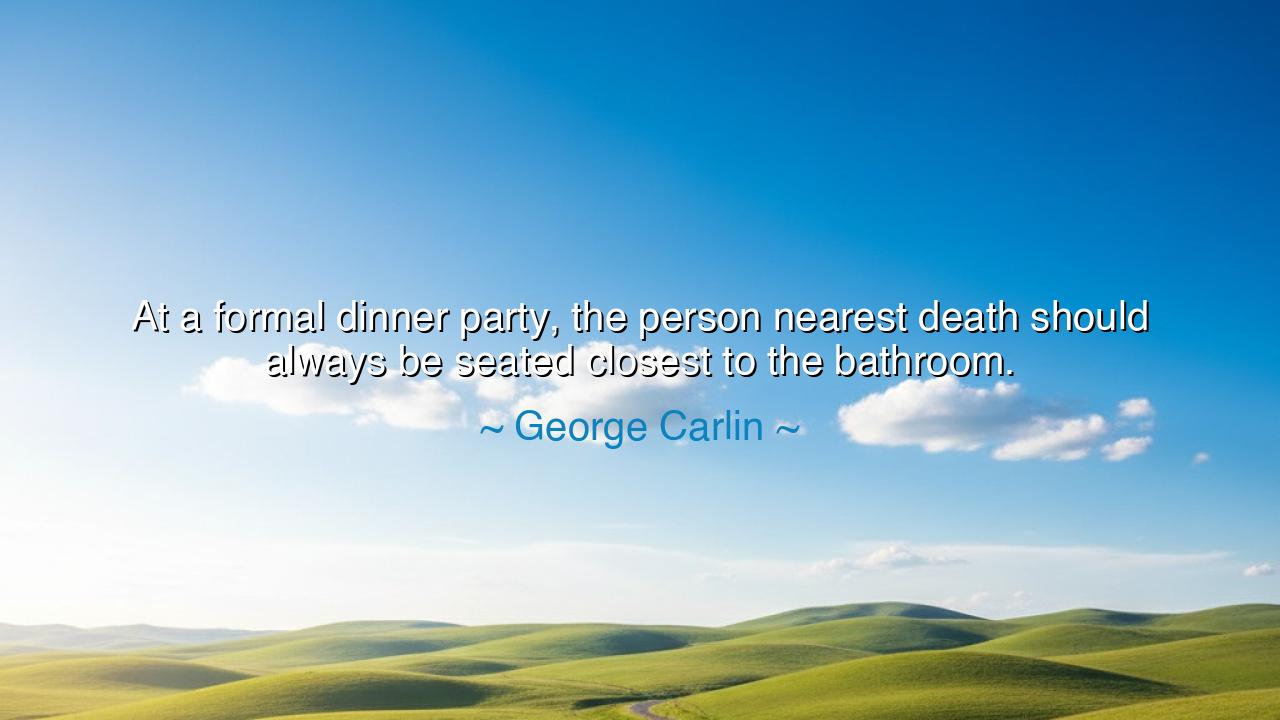
At a formal dinner party, the person nearest death should always
At a formal dinner party, the person nearest death should always be seated closest to the bathroom.






When George Carlin said, “At a formal dinner party, the person nearest death should always be seated closest to the bathroom,” he spoke not merely as a comedian, but as a philosopher of laughter — one who revealed profound truths hidden beneath humor. His words, though framed in jest, strike at the heart of the human condition: the frailty of mortality, the absurdity of social pretense, and the eternal dance between dignity and decay. Beneath the laughter, there lies a message as ancient as time — that life, in all its grandeur and ceremony, must always bow before the simple, humbling needs of the body.
The origin of this quote rests in Carlin’s sharp-eyed critique of modern manners and the hypocrisy of civilized life. He, like the jesters of old, used humor as his weapon — not to mock without meaning, but to pierce through illusion. The formal dinner party, that symbol of elegance and decorum, is his stage; but his lesson concerns far more than seating arrangements. Carlin’s wit reveals the tension between how we pretend to be — graceful, refined, immortal — and what we truly are: fragile beings bound by hunger, age, and time. By suggesting that the oldest or weakest guest be seated near the bathroom, he unmasks the fragility hidden behind the mask of civility. It is both a joke and a meditation on the inevitability of decline.
The meaning of his words runs deeper than the laughter they provoke. For what is the “bathroom,” if not a symbol of life’s most basic truths — the needs we all share, the vulnerabilities we cannot escape? And what is “the person nearest death,” if not each of us, in varying degrees, walking the same road toward the same end? Carlin reminds us, with biting humor, that no title, wealth, or etiquette can separate us from our common mortality. We may wear fine clothes and toast with golden glasses, but the body remains what it is — mortal clay, both majestic and comic. His wisdom whispers that the truest form of enlightenment is to laugh at our condition, to accept with grace what we cannot control.
In this, Carlin joins the company of the ancient satirists — those wise jesters of Greece and Rome who mocked kings and philosophers alike. The Roman poet Juvenal, for instance, exposed the hypocrisy of Rome’s noble classes with biting humor, reminding them that their pomp and vanity were fleeting. Even Diogenes, the Cynic philosopher, lived in a barrel and laughed at society’s pretensions, showing that simplicity and truth often dwell beneath ridicule. Carlin’s words spring from this same tradition: the humor that humbles, the laughter that enlightens. He invites us to see that the ceremonies of life — dinners, titles, appearances — are but theater before the inevitable curtain of death.
There is a story of Benjamin Franklin, who, though a man of learning and invention, once jested about the dignity of human needs. In his famous essay “Fart Proudly,” Franklin ridiculed the obsession with propriety, arguing that nature’s truths should not be shamed by manners. His humor, like Carlin’s, tore through pretense to reveal a universal fact: that wisdom begins with humility. Franklin, too, would have understood Carlin’s jest — that the one “nearest death” deserves not pity, but compassion; not distance, but comfort. In this simple image of seating the frail near the bathroom, Carlin gives form to the greater virtue of empathy: the recognition that one day, it will be us in that seat.
Thus, the quote becomes more than mockery; it becomes a mirror. It reminds us that all the structures we build — wealth, status, etiquette — exist only to distract us from the truth of our impermanence. But the wise do not fear that truth; they embrace it. To laugh at death is to loosen its grip. To recognize our shared frailty is to awaken to compassion. The “bathroom,” humble and unspoken, becomes the altar of equality — the place where every man and woman, from beggar to king, kneels before the same reality.
So take this lesson, child of dust and laughter: live with grace, but never with pretense. Do not take life so seriously that you forget to laugh at it. Treat the fragile with kindness, the aging with honor, and yourself with humility. Know that your strength and beauty are passing, and let that knowledge soften your pride and sweeten your days. For as George Carlin teaches through his jest, we are all guests at the same banquet of life — and though some sit closer to the door, we all share the same meal, the same laughter, and the same final silence. Therefore, laugh deeply, love kindly, and live wisely — for even the person nearest death deserves both dignity and joy before the evening ends.






AAdministratorAdministrator
Welcome, honored guests. Please leave a comment, we will respond soon